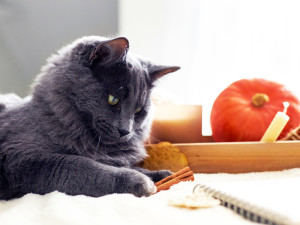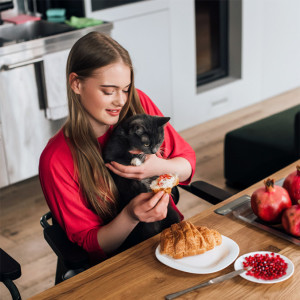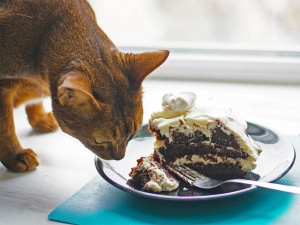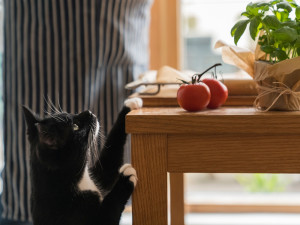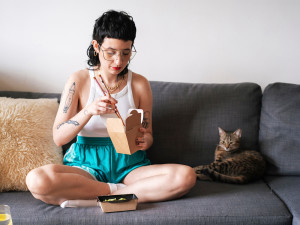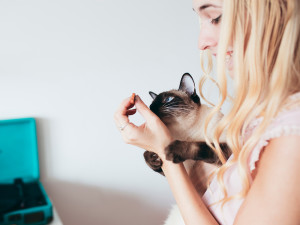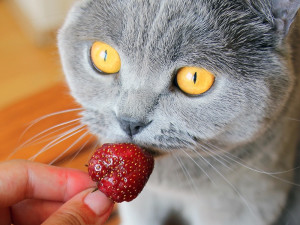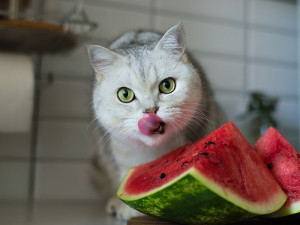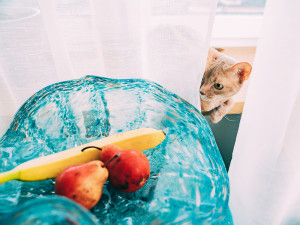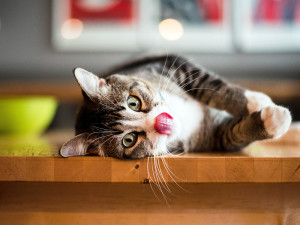Can Cats Eat Marshmallows?
These puffy delights are non-toxic to our puffy delights (aka cats) but that doesn’t mean they should have s’more (get it?).
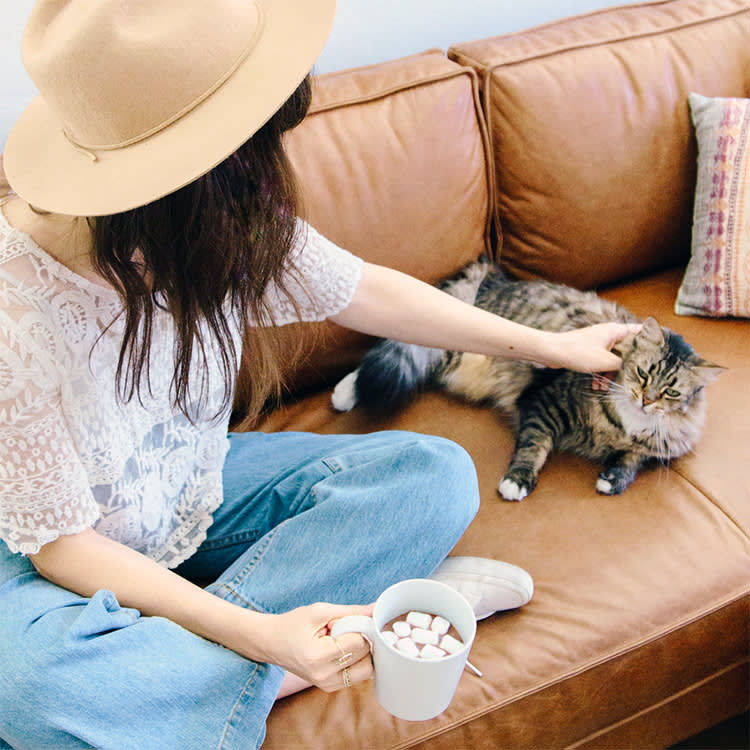
share article
We can all agree that marshmallows are delicious puffs sent from heaven — not unlike our cats. But should your cat get in on this squishy snack? Can cats have marshmallows? No, they should not eat marshmallows. Being a high-fat and sugar food, marshmallows are a no-go for kitties. Luckily, these pillowy treats aren’t toxic to cats — so you shouldn’t panic if your cat eats one or two.
Can cats eat marshmallows?
No, cats should not eat marshmallows. “Marshmallows contain high amounts of sugar, which is not suitable for a cat’s diet,” Dr. Butzer says.
In general, cats should not be given high sugar treats (and btw, they can’t even taste the sweetness!opens in a new tab). But marshmallows do present a separate danger outside their nutritional content. Due to their unique texture, marshmallows can be a choking hazard. The powdery, thick texture we enjoy in marshmallows can actually be hard for your cat to chew and swallow. It’s best not to share these treats, no matter how loud the meows get.
Are marshmallows toxic to cats?
No, marshmallows are not toxic to cats — so don’t panic if your cat steals a few; just don’t give them s’more. (OK, we promise that’s the last s’more joke in this very serious explainer about marshmallows.)
Can cats eat marshmallow fluff?
No, cats should not eat marshmallow fluff. And trust us, you do not want to clean marshmallow fluff off of a squirmy kitty.
What should I do if my cat has eaten marshmallows?
Again, marshmallows are not toxic to cats — but they can experience adverse gastrointestinal symptomsopens in a new tab if they eat a few too manyopens in a new tab.
“If your cat accidentally eats marshmallows, keep an eye on them for any signs of digestive upset, like vomiting or diarrhea,” Dr. Butzer advises. “If you notice any symptoms or are concerned about your cat’s health, it’s best to consult your veterinarian.”
How do I stop my cat from eating marshmallows?
Felines can’t taste sweet things, so it’s unlikely they will crave these sugary treats. However, they can be motivated by texture, and marshmallows do have an interesting one. So, if you notice your cat sniffing around your marshmallows, make sure to store them in packaging your cat can’t access.
Avoid storing marshmallows on open shelves, counters, and the tops of refrigerators; cats can jump onto these surfaces.
What are some human foods that make for safe treats for cats?
Blueberries: These yummy, cat-safe berriesopens in a new tab can provide them with vitamin C, vitamin K, fiber, and more. These berries are so feline-friendly that some cat foods even list blueberries in the ingredients. Just be sure to cut blueberries into small enough pieces so as to avoid a choking hazard.
Strawberries: On the berry note, strawberries can be a great source of fiber for your catopens in a new tab. Again, make sure to cut strawberries into small pieces and serve them in small quantities.
Watermelon: Composed of 90 percent water, watermelon is a great source of hydration opens in a new tabfor your cat. If you have one of those cats who refuses to drinkopens in a new tab an ounce of water, watermelon can provide them with some much needed hydration. Before serving, make sure to dispose of the rind and seeds; those can be toxic for your cat.
What are some other human foods that are not safe for cats?
Grapes and raisins: Grapes and raisins are extremely toxicopens in a new tab to both cats and dogs. Keep all raisins and grapes up and away from cats, preferably in cabinets or in fridges. Even a small amount of this fruit can pose serious health consequences for your cat. If you see or suspect they have eaten grapes or raisins, contact your vet immediately.
Citrus fruits: Citrus fruits contain essential oilsopens in a new tab, which can pose serious health problems for cats. Essential-oil toxicity is also unique in that it can occur if your cat ingests the fruit or gets oils from the fruit on their fur or paws. Thankfully, essential-oil toxicity exists on a wide spectrum, so the less your cat makes contact with these fruits, the better. For more info on cats and essential oils, check out our guide here.
The bottom line: Can cats eat marshmallows?
Although puffy and delicious to humans, marshmallows should not be enjoyed by your cat. As with humans, there is really no nutritional element to marshmallows — sorry to be the one to break that to you. Unlike humans, cats can’t digest sugar as well because it’s not a necessary part of their diets. TLDR: Save the marshmallows for s’more human companions (had to save the worst s’more joke for last).
FAQ (People Also Ask):
Are marshmallows toxic to cats?
No, marshmallows are not toxic to cats. In large quantities, they might experience gastrointestinal upset. Another danger to letting your cat eat marshmallows is that they might be a choking hazard given their texture.
Are marshmallows good for cats?
No, marshmallows are not good for cats. They’re also not good for humans despite being one of the few puffy, pillowy treats in the world that make life worth living.
Why do cats like marshmallows?
Cats don’t have sweet receptors, so it’s unlikely marshmallows would hold their attention for very long. Keep in mind that kitties can be texture-motivated and might enjoy gnawing on the sticky, soft confections. With that in mind, keep marshmallows stored in a closed cabinet or fridge.

Rebecca Caplan
Rebecca Caplan is a writer based in Brooklyn whose work has been featured in The New Yorker, Reductress, and Vulture. She lives in Brooklyn with her perfect, toothless dog Moose.
Related articles
![Woman with tattoos eating noodles on the couch with her cat]() opens in a new tab
opens in a new tabCan Cats Eat Garlic?
It’s a human cooking staple, but your cat shouldn’t indulge.
![Blonde woman holding cat trying to feed it ham]() opens in a new tab
opens in a new tabCan Cats Eat Ham?
Skip the green eggs, but ham is OK — with a couple caveats.
![Grey cat eats a strawberry]() opens in a new tab
opens in a new tabCan Cats Eat Strawberries?
Soon, they’ll be demanding you make this strawberry ice cream recipe on repeat.
![White kitten with tongue out next to slices of watermelon]() opens in a new tab
opens in a new tabCan My Cat Safely Enjoy Watermelon? A Guide to Feline Dietary Choices
Yes, the summertime staple is on the list of “safe” foods for cats.
![Cat behind a curtain attempting to get fruit in blue bowl]() opens in a new tab
opens in a new tabWhat Fruits and Veggies Can Your Cat Feast On?
Pass the fruit bowl — it’s treat time.
![Cat laying on his side with catnip around him, on the kitchen table licking his lips.]() opens in a new tab
opens in a new tabCan Cats Eat Catnip?
They’re definitely pulling for the answer to be an emphatic “yes,” but...not so fast.
